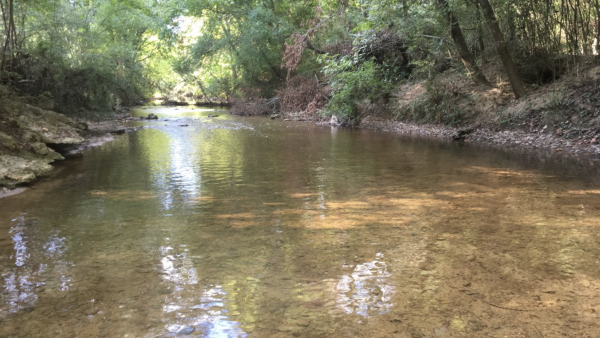Trump’s EPA Seeks to Remove Much of Nation’s Headwaters and Wetlands From Protection

By Hank Black
President Trump moved yesterday to weaken the federal Clean Water Act by redefining the Obama administration’s Waters of the US rule, known as WOTUS, to eliminate protections for much of the nation’s waterways – a majority, in some estimates.
The action principally would remove oversight for small tributary headwaters that do not flow year-round and for wetlands not clearly connected to flowing streams.
The proposed new rule by the Environmental Protection Agency is expected to be challenged and eventually work its way to the U.S. Supreme Court, where a conservative majority now sits.
The proposal is seen as a boon to the president’s rural base. In Alabama, business development and agricultural interests such as the Business Council of Alabama and Alabama Farmers Federation have supported the move, largely on the basis of property owners’ right to use their land as they see fit without subjecting farming and forestry practices to permits and large fines.
U.S. Rep. Terri Sewell, the only Democrat in Alabama’s congressional delegation, said she believed changes were needed to Obama’s rule but that she viewed the move by Trump as “misguided.”
“This Administration’s attempt to remove protections for thousands of miles of US waterways and wetlands puts our environment and our natural resources at risk,” Sewell said in an email. “While I believe that Obama’s Waters of the United States rule was not perfect, and that changes were needed to protect the work of our farmers, the Trump Administration’s elimination of environmental safeguards is misguided. In Congress, I will continue to be a voice for defending the environment while also protecting the work of Alabama farmers.”
Environmentalists in the state have long opposed changing the Obama version, saying it would endanger much of Alabama’s 132,000 miles of waterways, large and small, that provide drinking water, recreation, wildlife protection and crop irrigation.
The Alabama Rivers Alliance, an organization of water-protection groups, slammed the proposal. Policy director Curt Chaffin called the proposal the “dirty water rule” and said it “will make it easier to pollute those important headwaters.”
Birmingham Water Works Board official Darryl R. Jones has gone on record as saying the Obama rule keeps “pollution out of smaller streams that go into larger ones that we get water from for treatment. The less contamination in the source water, the less (treatment) we need to do to get clean, healthy drinking water… We’re at the mercy of what somebody does upstream.”
Jones is assistant general manager of operations and technical services for the Birmingham Water Works Board.
The Southern Environmental Law Center and others have won cases in recent months to delay the proposed rule, and the SELC vowed to continue to oppose it in court. In a statement, the SELC said the rule would be a “giveaway to polluters.”
SELC attorney Blan Holman said the proposal would give a “free pass to dump” and would be “a full-frontal assault on one of our country’s most important and longstanding environmental safeguards.”
He estimated that more than 60 percent of stream miles would cease to be protected from agricultural fertilizer that finds its way into small streams and wetlands well as sedimentation from road and big-development construction.
Without protection, Holman said, industrial operations, sewage treatment facilities and others “may be able to directly dump into these waterways without any public notice, threatening drinking water supplies and harming families and communities.”
Environmental groups urged people to object to the new rule before it becomes final. “If citizens care about clean drinking water or recreation here in Alabama, they must tell the EPA to reject the proposal,” Chaffin, of the Alabama Rivers Alliance, said.
McLaren’s Lando Norris wins first F1 title at season-ending Abu Dhabi Grand Prix
Red Bull driver and defending champion Max Verstappen won the race with Norris placing third, which allowed Norris to finish two points ahead of Verstappen in the season-long standings.
A ban on feeding pigeons ruffles lots of feathers in Mumbai
The pigeon population has exploded — a result of people feeding the birds. For some it's a holy duty and a way to connect to nature. Critics point to health risks tied to exposure to pigeon droppings.
‘Rosemead’ tells a tragic — and true — story
The new movie stars Lucy Liu as an ailing mother to Joe, played by Lawrence Shou as a teenager facing mental illness in his feature debut role.
From 400-year-old globes to cosmic shrouds: A Maine library brings maps to life
From 400-year-old globes to cosmic funeral shrouds, how the Osher Map Library in Maine shows people that maps aren't just for navigation — but windows into history, culture, and how we see the world.
Benin’s interior minister says a coup announced earlier has been foiled
Earlier, a group of soldiers had appeared on Benin 's state TV Sunday to announce the dissolution of the government in an apparent coup, the latest of many in West Africa.
A fire at a popular nightclub in India’s Goa state kills at least 25, officials say
At least 25 people, including tourists, were killed in a fire at a popular nightclub in India's Goa state, the state's chief minister said Sunday.






